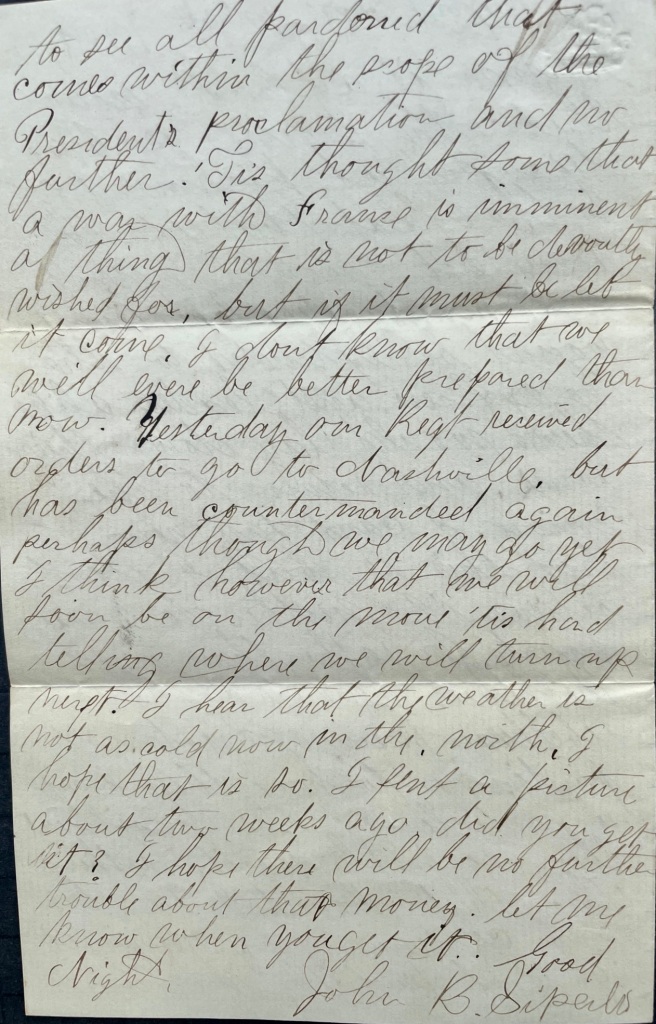
The following letter was written by John R. Siperly who was enumerated in his parents household in Delavan, Walworth county, Wisconsin at the time of the 1860 US Census, as a 23 year-old carpenter. John’s parent’s, Peter and Elizabeth (“Betsy”) Siperly, had relocated to Wisconsin prior to 1850 from the area around Rhineback, Dutchess county, New York.
John enlisted in August 1862 to serve as a private in Co. D, 22nd Wisconsin Infantry—sometimes referred to as “the Abolition Regiment.” He served a total of 2 years and 10 months, mustering out in June 1865. Though John wrote his father that he thought there were many signs for a “speedy close of this war” and even of peace negotiations, the heaviest days of fighting for the 22nd Wisconsin lay ahead of them, not behind them.
In 1867, John married Mary C. Church (1848-1906), and resumed in carpentry career in Walmouth county.
[Note: This letter is from the personal collection of Greg Herr and was transcribed and published on Spared & Shared by express consent.]
Transcription

Postmarked Murfreesboro, Tennessee
Fort Overall
February 4, 1864
10 o’clock at night
Mother & Father,
Well, I have been reading newspapers laying abed and killing mice tonight and the latter employment caused my mind to revert to the times I used to have at home sometimes at killing mice when the idea suggested itself to me that I had better scribble a few words for the remaining inmates of that home. Well, now it is darned late so you see I can’t say much—only to say that I am still well in the very best degree. We still have very pleasant weather though for the few last days it has been somewhat cooler and tonight looks like rain.
Important and encouraging [news] is being heard from different departments of the army—of desertions on a large scale in the rebel army; of mutinies, the most important one at Mobile; and grand victories of our forces, all of which betokens a speedy close of the war. It is a fact beyond a doubt that the majority of the men in the rebel army are fast seeing their mistake and would gladly give up if they could as many of them are doing.
A rumor is afloat now that the matter is being discussed at Richmond to the effect that if the president would extend his amnesty proclamation to the officers and leaders alike, they would lay down their arms and return to the Union. I can’t say how true this is but I don’t believe it. Neither do I care much, for rather than to see the hellish leaders of this rebellion receive one iota of pardon, or to have them escape a particle of the punishment they so justly merit, rather than that I would see this war continue five years yet. I feel perfectly willing to see all pardoned that comes within the scope of the President’s Proclamation and no further.
Tis thought some that a war with France is eminent—a thing that is not to be devoutly wished for. But if it must be, let it come. I don’t know that we will ever be better prepared than now.
Yesterday our regiment received orders to go to Nashville but has been countermanded again. Perhaps though we may go yet. I think, however, that we will soon be on the move. Tis hard telling where we will turn up next.
I hear that the weather is not as cold now in the North. I hope that is so. I sent a picture about two weeks ago. Did you get it? I hope there will be no further trouble about that money. Let me know when you get it. Good night. — John R. Siperly




